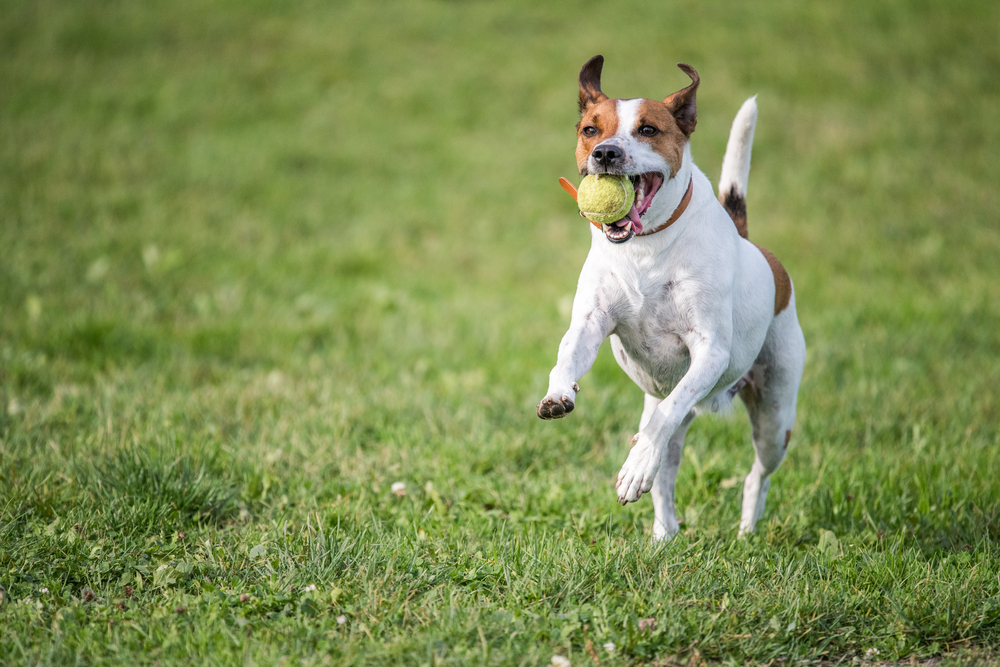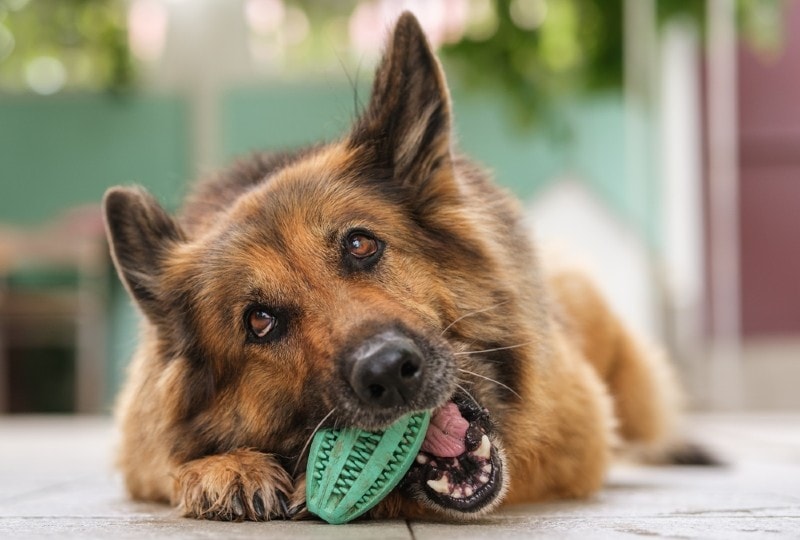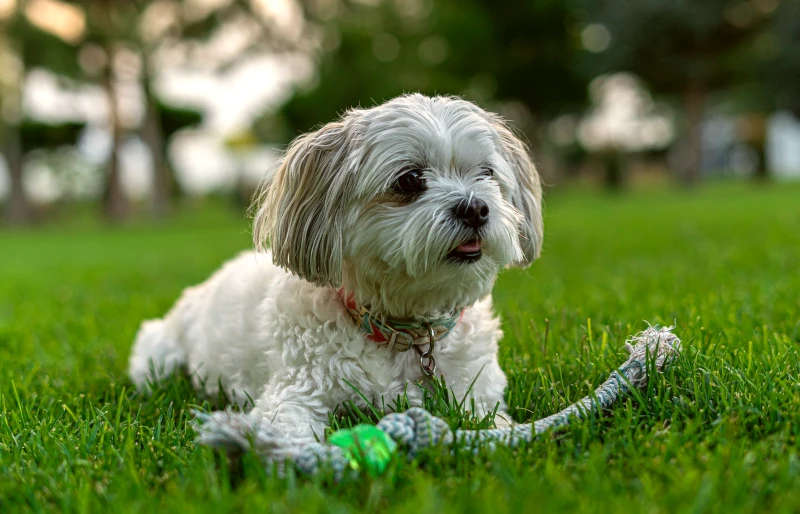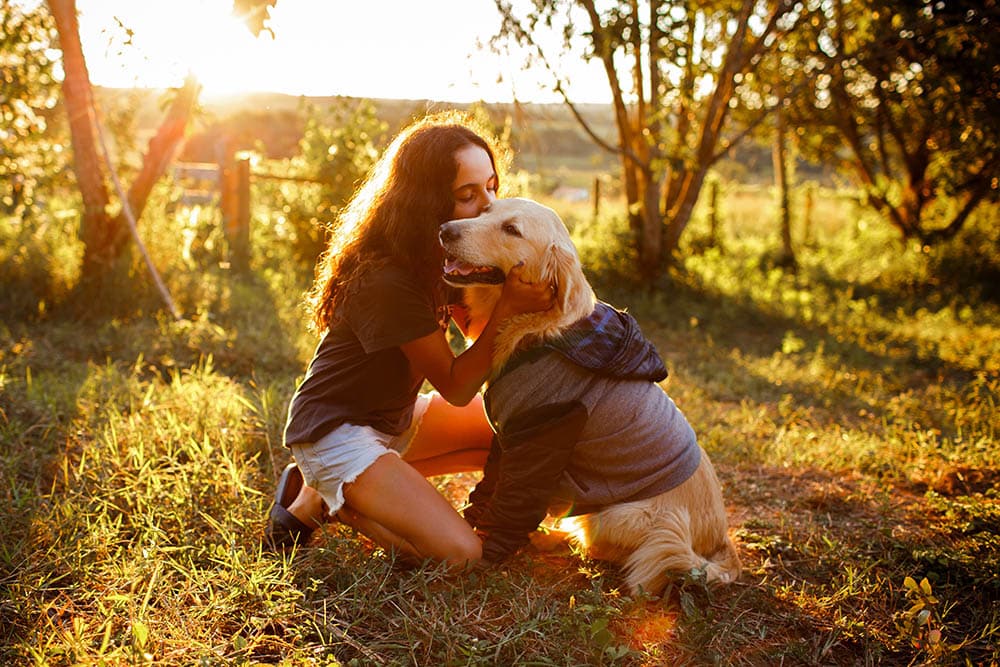Some dogs love to chase them around the garden, and others become so attached to them that they can’t sleep without them and even get a little anxious when they’re in the washing machine. Dog toys can take a lot of different forms and fulfill many different purposes.
Dog toys come in many varieties, from tennis balls that are ideal for chasing to interactive treat toys that are not only good for playing but also reward them for intelligent problem-solving. Playtime is fun for dogs; it provides physical and mental stimulation, helps remedy behavioral problems, may promote better dental hygiene, assists with training, and improves the bond with their humans.
Read on for eight reasons why dog toys and playtime are important for dogs.
The 8 Reasons Why Dog Toys and Playtime Are Important for Dogs
1. Physical Exercise
Most dogs need more than just a quick walk around the block. Chasing a toy around the yard can be a great way to get the physical exercise they need while turning it into a game. If you are looking to provide your dog with exercise using a toy, look for toys that are easy to throw and also easy for your dog to carry. It is also a good idea to make sure that the toy is durable enough to last a long time and easy to clean for multiple playtime sessions.

2. Mental Stimulation
Toys and playtime don’t just exercise the joints and muscles, they also provide mental stimulation and help exercise the brain. Some toys provide greater mental stimulation than others. Puzzle games are very good for exercising the brain and some include a treat or a morsel when the puzzle is successfully solved. Mental stimulation may also delay the onset of conditions like canine dementia.
3. Beat Behavioral Problems
Dogs that get bored can develop behavioral problems that range from constant barking to destructive behavior. Lonely and anxious dogs may also develop similar problems, and one way that you can help combat these problems is by leaving appealing toys with them. If you don’t leave something fun for your dog when you’re out, they may look for ways to make their own fun, which is when negative behavior can occur.

4. Training Aid
You can use playtime to train your dog. Whether it’s fetch, any commands, or good off-leash recall, you can use a toy to encourage positive behavior, which you can then reward so that the dog will continue to exhibit that positive behavior in the future.
5. Anxiety Prevention
6. Reduce Loneliness
One major cause of anxiety in dogs is loneliness. They are companions, and while most dogs can get along just fine if they are left for an hour or so, some struggle even after this short length of time. Separation anxiety can lead to destructive and other unwanted behaviors. While a toy is no substitute for human or canine companionship, it can help to fill the void. And if the toy is an interactive one that provides stimulation, it will, at the very least, take your dog’s mind off the lack of company.
7. Bonding
Playtime is fun for your dog, and it can be fun for you. It is also a great way to build a bond between the two of you, and a strong bond is important. It not only reduces anxiety in your dog but can also reduce anxiety in people. What’s more, toys can also create a bond between two or more dogs, if you have a pack of canine companions in your home.

8. Dental Hygiene
Dental hygiene is important to dogs and is often overlooked by owners who don’t want to get out of the doggy toothbrush. Toys in the form of dental chews, or dual-purpose toys that also serve as a dental chew, help keep your pup’s teeth clean and reduce the rate at which plaque and tartar builds up on their teeth. Although they don’t do the same job as toothpaste, dental toys can prevent plaque and tartar buildup.
How Often Should Dogs Play with Toys?
It can be tempting to buy new toys every time you visit the pet shop, but you should avoid inundating your dog with too many options. Try to limit their everyday toys to two or three. You can have special toys, like tug ropes and tennis balls, that are kept for specific times, too. If you do like to keep providing new toys, rotate the ones you have and change your dog’s selection every few days. This can also help avoid a situation where your dog becomes too attached to a specific toy.
How often your dog plays with toys will depend on their breed, what other exercise they get, the type of toy in question, and the character and energy level of the individual dog.

What Happens If I Don’t Play with My Dog?
First and foremost, dogs that don’t get regular playtime are more likely to develop behavioral issues. These can range from destructive behavior to jumping up and constant whining or barking. They are also more likely to develop anxiety and, if they aren’t getting enough exercise from other sources, a dog that isn’t getting regular playtime is likely to become overweight. Boredom can lead to depression in dogs, which is often accompanied by a plethora of other health issues.
Conclusion
Dogs need to play because it provides exercise and mental stimulation. It can help reduce anxiety and boredom while helping relieve feelings of loneliness. As a result, it can reduce the risks of physical and mental health conditions ranging from obesity to dementia.
While you don’t have to play all evening, every evening, it is a good idea to dedicate a small amount of time to playtime at least once a day, and have a decent selection of toys for certain types of playtime. You will both benefit from the variety.
Featured Image Credit: Castorly Stock, Pexels
Contents
- The 8 Reasons Why Dog Toys and Playtime Are Important for Dogs
- 1. Physical Exercise
- 2. Mental Stimulation
- 3. Beat Behavioral Problems
- 4. Training Aid
- 5. Anxiety Prevention
- 6. Reduce Loneliness
- 7. Bonding
- 8. Dental Hygiene
- How Often Should Dogs Play with Toys?
- What Happens If I Don’t Play with My Dog?
- Conclusion













